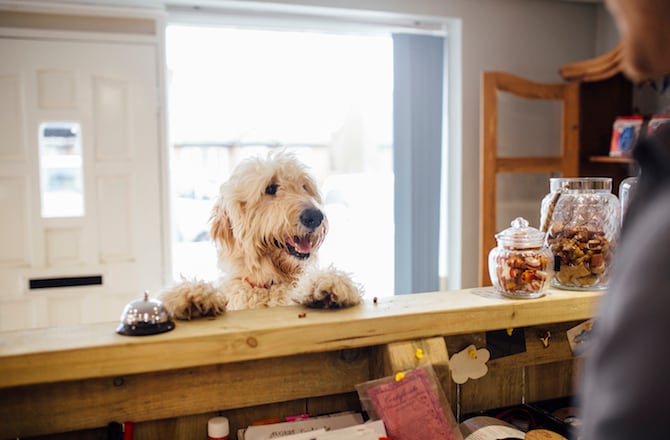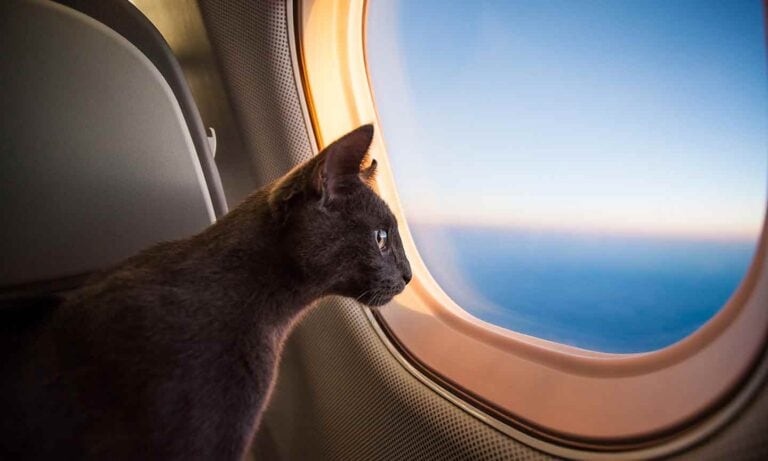Gone are the days when leaving your dog at a basic kennel was the only option. Dog parents who need to be away from home now have an abundance of choices. From small pet hotels with basic amenities to luxury pet resorts, there are now accommodations that suit the needs of every dog and pet parent.
But how do you know if a facility is worthy of your trust? Doing your homework can mean less worry for you, and more tail wags for your dog. The following are some things to look for when checking out boarding options for your dog:
Find Out if the Services Offered Meet Your Needs

The pet hotel industry doesn’t rely on a starred rating system as we humans do, but services at pet facilities run the spectrum from simple to extravagant.
Twin Cities-based Woofington is for small dogs only, but provides a variety of luxurious services, says Carmen Rustenbeck, executive director & founder of International Boarding & Pet Services Association (IBPSA). Meanwhile, Your Pet Space in Las Cruces, New Mexico, is a community boarding facility that offers services such as taxi service, pet sitting and geriatric care, while Cinder Hills Kennels, located in the mountains of Flagstaff, Arizona, have expanded their services to include doggie daycare.
“All three are fabulous facilities, but are very different in what they offer and in their look,” Rustenbeck says.
Robin Bennett, author of “All About Dog Daycare,” says, that pet hotels now offer an endless range of services for dogs, from fetch and training sessions, to nature walks and fitness work.
“A great hotel will tailor the experience to the temperament and personality of the dog,” Bennett says.
Learn What Pricing Includes

Pricing structures vary within the pet hotel industry, and are partly determined by location.
“Fees can start anywhere from $25 per day for one pet, with a break for the second pet,” says Susan Sims, publisher of FIDO Friendly Magazine.
However, that price may not necessarily include extras, which is why Bennett suggests confirming which services are included in the base price.
“Some facilities cover everything in one price, and others charge a basic fee with added fees for additional services. Sometimes it’s hard to compare prices unless you know what is truly included,” Bennett says.
For example, she says many people prefer to bring their own dog food. Some pet hotels will charge a fee for this, while others charge extra if the owner doesn’t bring their own food.
Any service may be subject to added fees. Junior, a nine-year-old Lab, and Jake, a seven-year-old Boxer, travel with Sims from Los Angeles to Chicago each year for their annual pet adoption tour. She says The Ruff House, with two locations in California, charges an additional fee for use of the swimming pool, but adds that “this is an additional fee that we pet parents are happy to pay so our pets have the best time!”
Look for a Well-Maintained Facility

A pet hotel doesn’t necessarily have to look palatial to be good, but it should be clean and well- maintained. What are your first impressions when you walk in the door?
One giveaway that there may be issues with cleanliness is the presence of obvious odors.
“The facility itself should not smell like urine and [you] should ask how often [your] pet’s room will receive cleaning,” says Rustenbeck.
Bennett adds that the building should also be well-maintained.
“I would look for safety issues in terms of how secure the building is—double gates to get in and out of dog play areas, and fences that are at least six to eight feet high,” she says.
Find Out How Well-Prepared They Are for Emergencies

Any number of situations can arise, from fires and tornadoes to break-ins and health issues. How solid are the facility’s emergency plans, and how prepared are staff?
“We believe facilities should take advantage of the safety/risk management certification offered through IBPSA, as it covers all OSHA standards and regulations for our industry,” Rustenbeck says.
She adds that staff should also be qualified to handle dog emergencies.
“What we support is that all staff have participated in a pet first aid and CPR course so that they are better able to address emergencies with the pets should they happen.”
Make Sure the Facility Adheres to Industry Standards

Getting certified by professional organization means a facility has taken extra steps to adhere to industry standards. Members of IBPSA, for example, agree to follow a code of conduct, which includes abiding by federal, state, and local laws and regulations. They must also take continuing education courses to be considered for renewal.
Third-party certification is offered through Professional Animal Care Certification Council, a nonprofit that seeks to maintain pet care industry standards.
“This certification is new,” Rustenbeck says, “So it will take a year for the industry to really catch up.”
Rustenbeck says the IBPSA also encourages members to ensure that their employees are certified in specific services.
“So if a boarding facility wants to add pet sitting as a service, then that pet sitter should have their certification,” she says. “For most services that a facility can provide there is a certification program out there.”
Find Out if Dogs Receive Individualized Treatment

Your dog should be treated as an individual. For example, the hotel should be willing to abide by your feeding schedule. Many facilities feed pets twice a day, but Rustenbeck says that if a different feeding schedule is needed, it should be discussed with the facility before booking the pet’s stay. If special preparation of food is needed that should also be discussed.
Sims suggests asking about bringing your dog’s bedding or favorite toy from home, as some facilities will not allow anything to be brought from home.
Learn How Interaction with Other Dogs Will Be Handled

Pet hotels that allow dogs to interact with each other should have a dog evaluation policy, Rustenbeck says.
“If the owner’s pet has had negative interactions with other dogs, then they need to disclose that information and ask how the facility will ensure those interactions will not occur,” she says.
Sims suggests first-time boarders experiment with a half-day of daycare and ultimately work up to overnight boarding.
“Our dogs don’t look back when we drop them off for daycare, a good sign they are happy and ready to play,” she says.
At the very least, request a tour of the facility before dropping your dog off for a stay. The IBPSA maintains a list of common questions pet owners should ask before they board at a facility.

Paula Fitzsimmons is a freelance writer and researcher specializing in companion animal health and nutrition, and science. She’s written for clients like Prevention magazine, PetMD.com, PawCulture.com, Parrots magazine, and University of Texas-Arlington. She lives in Madison, Wisconsin with her husband and feathered family members, including parrots Whit and Sweetpea.
Share:









